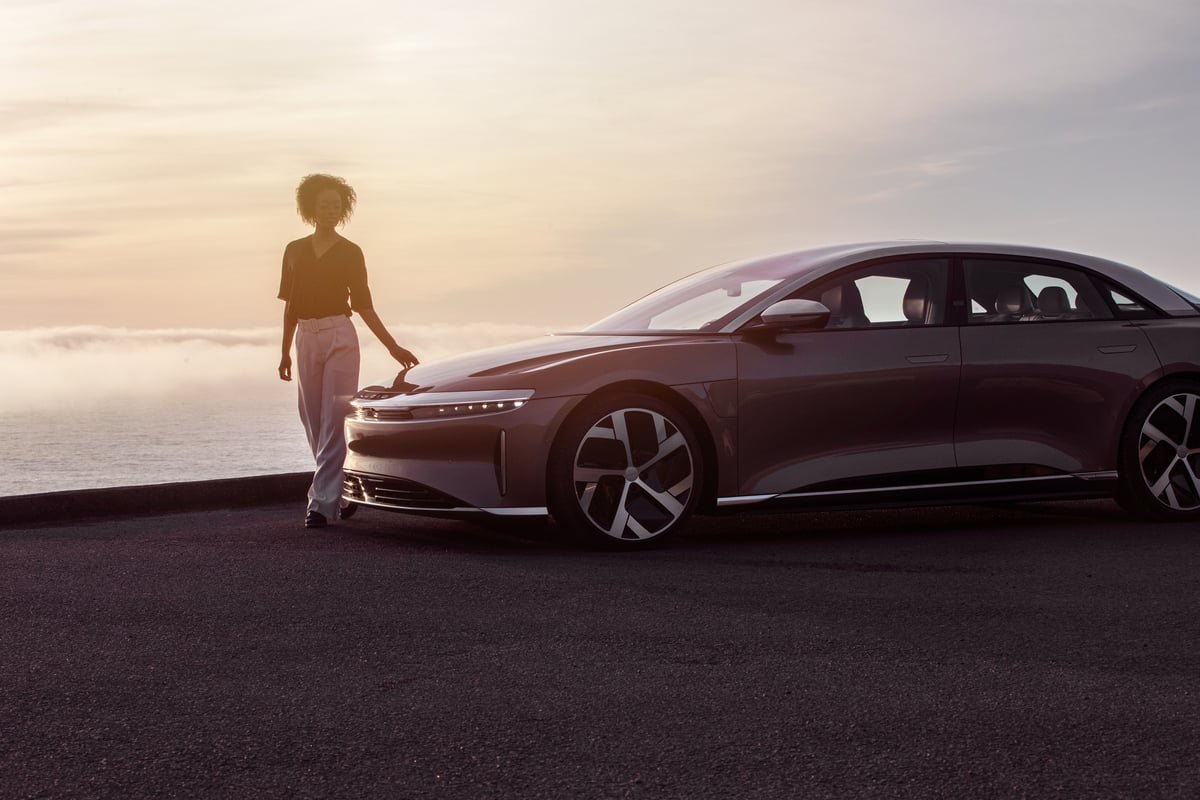Lucid Group's (LCID +2.09%) stock skyrocketed 43% on Jan. 27 amid rumors of a takeover by its Saudi Arabian investors. The rumors, which first surfaced on the market gossip site Betaville, haven't been confirmed.
According to that story, Saudi Arabia's Public Investment Fund (PIF), which already owns nearly two-thirds of the luxury electric-vehicle maker, is interested in buying out the rest of its shares and taking it private. That wouldn't be too surprising in light of Lucid's recent dealings in Saudi Arabia.
Last year, Lucid announced it would build its first overseas production plant in Saudi Arabia. The Saudi government, which is supporting that plant with subsidies, reaffirmed its commitment to purchase up to 100,000 vehicles from Lucid over the following 10 years. The PIF also invested another $915 million into Lucid's new stock offering last December.

Image source: Lucid.
Should investors chase Lucid's recent rally, or will it give up those gains as the takeover buzz is drowned out by other news? Let's review Lucid's trials and tribulations to see if it's too late to buy its volatile stock.
The "next Tesla" got off to a rough start
When Lucid went public by merging with a special-purpose acquisition company (SPAC) in 2021, many investors compared it to Tesla (TSLA +0.04%). Lucid CEO and CTO Peter Rawlinson was once Tesla's chief vehicle engineer, the "Dream" edition of its Lucid Air sedan could travel approximately 100 miles farther than Tesla's Model S Long Range on a single charge, and both automakers targeted the same affluent buyers.
Lucid initially claimed it could produce 20,000 vehicles in 2022. But it slashed that target to 12,000-14,000 vehicles last February, and then halved its forecast again to just 6,000-7,000 vehicles last August. It eventually produced 7,180 vehicles for the full year but delivered only 4,369 of them. Lucid blamed that sluggish production on the ongoing supply chain issues, yet Tesla still delivered 1.31 million vehicles in 2022.
Lucid hasn't posted its fourth-quarter and full-year earnings report yet, but analysts expect it to generate $663 million in revenue in 2022 as it racks up a net loss of $1.88 billion. Those steep losses, which are likely to persist for the foreseeable future as its ramps up its production, made Lucid a tough stock to own as interest rates continued to rise.
A few other red flags appeared over the past year. Lucid recalled all of its vehicles last February over potential suspension problems, recalled them again last May because of wiring issues, and was hit by several complaints regarding power issues and malfunctioning gears near the end of 2022. Its total number of reservations, which had steadily risen up to around 37,000 in the second quarter of 2022, also unexpectedly dropped to about 34,000 in the third quarter as more customers seemed to lose patience in Lucid's ongoing delays and recalls.

NASDAQ: LCID
Key Data Points
Lucid is counting on Saudi Arabia to accelerate its growth
Lucid's Arizona plant can currently produce 34,000 vehicles annually. It's expanding that plant to boost its annual capacity to 90,000 vehicles by 2023 to support the launch of its next vehicle, the Gravity SUV, in 2024.
Lucid originally expected to produce 500,000 vehicles annually by 2030, which would represent a jaw-dropping compound annual growth rate (CAGR) of 70% from 2022. But with the increased support of its Saudi Arabian investors, it expects to cross the half-million mark by 2025 -- which would represent an even more dizzying CAGR of 311%. If its revenue also rises at the same rate, it could generate $44 billion in revenues in 2025.
That explains why Saudi Arabia's PIF has been accumulating such a large stake in Lucid while giving it the tools and funds to achieve its long-term goals. With a market cap of $23 billion, Lucid might seem expensive at 36 times this year's sales. But if it can produce around 500,000 vehicles by 2025, its valuations could be quickly compressed as its revenue skyrockets.
In that context, it makes a lot of sense for the PIF to just buy out the remaining third of Lucid it doesn't already own, take it private to avoid the near-term scrutiny of analysts and investors, and then take it public again in the future after it's scaled up its business. That's what the PIF previously attempted -- but ultimately failed -- to do with Tesla back in 2018.
Is it too late to buy Lucid?
Lucid's stock is still down more than 50% after its latest rally. It's certainly in better shape than many other SPAC-backed EV makers, and it won't run out of cash as long as the PIF remains so heavily invested in its long-term success. Therefore, I don't think it's too late to buy Lucid. Its upside potential might be limited if the PIF takes the entire company private, but it could still go much higher if the PIF steps back and simply lets Lucid ramp up its production over the next few years.






